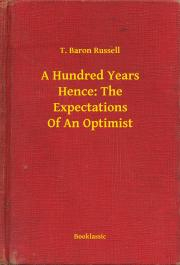A Hundred Years Hence: The Expectations Of An Optimist - Russell T. Baron
Knihu kúpite v
1 e-shope
od
0,88 €
Panta Rhei
0,88 €
Skladom
(dodanie do 3 dní)
Krátky popis
In this serious attempt to forecast the changes ahead in the 20th
century from the year 1906, the author deals with the accelerating
rate of scientific progress, housing, travel, population, business,
pleasure, newspapers, utilization of the sea, science, education,
religion, economics, and law. He describes his intentions in the
following manner in his Preface:"The following was at first
intended to be no more than an attempt to foresee the probable
trend of mechanical invention and scientific discovery during the
present century. But as the work took shape it was seen to involve
a certain amount of what may be called moral conjecture, since the
material progress of the new age could not very well be imagined
without taking into account its mental characteristics. In these
expectations of an optimist, a great ethical improvement of the
civilised human race has been anticipated, and a rate of progress
foreseen which perhaps no previous writers have looked for. Both in
regard to moral development and material progress, it has been the
aim of the author to predict nothing that the tendencies of
existing movement do not justify us in expecting. "An attempt of
this kind is exposed to facile criticism. It will be easy for
objectors to signalise this or that expected invention as beyond
scientific possibility, that or the other moral reform as fit only
for Utopia. But those who will consent to perpend the enormous and
utterly unforeseen advance of the nineteenth century will recognise
the danger of limiting their anticipations concerning the
possibilities of the twenty-first. A fanciful description in (I
think) Addison's Spectator of an invention by which the movements
of an indicator on a lettered dial were imagined to be reproduced
on a similar dial at a distance, and employed as a means of
communication, must have seemed wholly chimerical to its readers;
and even as recently as fifty years ago, anyone who predicted the
telephone would have been laughed at. When the principle of the
accumulator was already discovered a very competent practical
electrician told the writer that he need not worry himself much
about the idea : there was not the least likelihood that
electricity could ever be "bottled up in cisterns"! On the whole
there is more likelihood of error in timidity than in boldness when
we attempt to foresee what will be attained after the increasingly
rapid movement of scientific progress during this twentieth century
shall have gathered full force. "For the rest, criticism of this
sort is disarmed, because the reader has been in any case invited
to enter a realm of more or less pure imagination. No one can
exactly know with what births, monstrous or beautiful, the future
may teem. Admitting a certain point of view — that of almost
unrestrained optimism — the predictions here offered will, it is
believed, be found to be along the line of existing progress." No
details of the author's life have been found on the Internet, but
he seems to have been British since his preface is signed with a
city in England, he makes references to London as well as to US
cities, and he uses British spellings. This book was published in
1906 in the United States, so it is in the public domain in the
United States, and perhaps elsewhere. For information on copyright
and the public domain, see http://www.publicdomainday.org/ .

